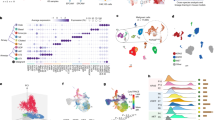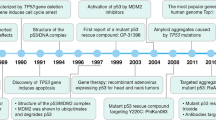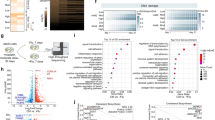Abstract
Hepatocarcinoma represents one of the most malignant cancer types. Esophageal cancer-related gene 2 (ECRG2) is found to be critical in the process of carcinogenesis. It regulates urokinase-type plasmin activator receptor and extracellular matrix function and its polymorphism in exon 4 is associated with cancer relapse. To explore new strategies to fight against cancer, here we first systematically evaluated the therapeutic potential as a biological tool using adenoviral vector (Ad-ECRG2). Ad-ECRG2 is exogenously expressed in cytoplasm and is potent to suppress the growth of cancer cell by inducing apoptosis as effective as Ad-p53. Ad-ECRG2 is able to suppress the invasion and adhesion of cancer cells at low titers. It alters the expression of a panel of cancer-related molecules, including nuclear factor-kB, matrix metalloproteinase 2 and E-cadherin, contributing to reverse malignancy phenotype of cancer cells. In vivo experiments show a significant inhibition of cancer growth by intratumoral Ad-ECRG2 administration. No evident toxicity was observed in the model animal during the study. We concluded that ECRG2 is a potential molecular target in biological therapy strategies for cancer treatment.
This is a preview of subscription content, access via your institution
Access options
Subscribe to this journal
Receive 12 print issues and online access
$259.00 per year
only $21.58 per issue
Buy this article
- Purchase on Springer Link
- Instant access to full article PDF
Prices may be subject to local taxes which are calculated during checkout






Similar content being viewed by others
References
New treatment strategy enhances outcome for lung cancer. Cancer Biol Ther 2009; 8: iv.
Cacheux W, Le Tourneau C, Baranger B, Mignot L, Mariani P . Targeted biotherapy in metastatic colorectal carcinoma: Current practice. J Visc Surg 2011; 148: 12–18.
Alvi AJ, Austen B, Weston VJ, Fegan C, MacCallum D, Gianella-Borradori A et al. A novel CDK inhibitor, CYC202 (R-roscovitine), overcomes the defect in p53-dependent apoptosis in B-CLL by down-regulation of genes involved in transcription regulation and survival. Blood 2005; 105: 4484–4491.
Cui Y, Wang J, Zhang X, Lang R, Bi M, Guo L et al. ECRG2, a novel candidate of tumor suppressor gene in the esophageal carcinoma, interacts directly with metallothionein 2A and links to apoptosis. Biochem Biophys Res Commun 2003; 302: 904–915.
Cheng X, Lu SH, Cui Y . ECRG2 regulates ECM degradation and uPAR/FPRL1 pathway contributing cell invasion/migration. Cancer Lett 2010; 290: 87–95.
Huang G, Hu Z, Li M, Cui Y, Li Y, Guo L et al. ECRG2 inhibits cancer cell migration, invasion and metastasis through the down-regulation of uPA/plasmin activity. Carcinogenesis 2007; 28: 2274–2281.
Liu Y, Li Y, Wang H, Yu J, Lin H, Xu D et al. Reduced MTA1 expression by RNAi inhibits in vitro invasion and migration of esophageal squamous cell carcinoma cell line. Clin Exp Metastasis 2005; 22: 653–662.
Qian H, Yu J, Li Y, Wang H, Song C, Zhang X et al. RNA interference of metastasis-associated gene 1 inhibits metastasis of B16F10 melanoma cells in a C57BL/6 mouse model. Biol Cell 2007; 99: 573–581.
Su T, Liu H, Lu S . Cloning and identification of cDNA fragments related to human esophageal cancer. Zhonghua Zhong Liu Za Zhi 1998; 20: 254–257.
Cheng X, Shen Z, Yin L, Lu SH, Cui Y . ECRG2 regulates cell migration/invasion through urokinase-type plasmin activator receptor (uPAR)/beta1 integrin pathway. J Biol Chem 2009; 284: 30897–30906.
Cheng X, Shen Z, Yang J, Lu SH, Cui Y . ECRG2 disruption leads to centrosome amplification and spindle checkpoint defects contributing chromosome instability. J Biol Chem 2008; 283: 5888–5898.
Blessmann M, Kaifi JT, Schurr PG, Cihan A, Kalinin V, Trump F et al. Short tandem repeat polymorphism in exon 4 of esophageal cancer related gene 2 predicts relapse of oral squamous cell carcinoma. Oral Oncol 2008; 44: 143–147.
Kaifi JT, Cataldegirmen G, Wachowiak R, Schurr PG, Kleinhans H, Kosti G et al. Short tandem repeat polymorphisms of exon 4 in Kazal-type gene ECRG2 in pancreatic carcinoma and chronic pancreatitis. Anticancer Res 2007; 27: 69–73.
Yue C, Bi M, Tan W, Deng D, Zhang X, Guo L et al. Short tandem repeat polymorphism in a novel esophageal cancer-related gene (ECRG2) implicates susceptibility to esophageal cancer in Chinese population. Int J Cancer 2004; 108: 232–236.
Beg AA, Baldwin AS . The I kappa B proteins: multifunctional regulators of Rel/NF-kappa B transcription factors. Genes Dev 1993; 7: 2064–2070.
Han SW, Roman J . Fibronectin induces cell proliferation and inhibits apoptosis in human bronchial epithelial cells: pro-oncogenic effects mediated by PI3-kinase and NF-kappa B. Oncogene 2006; 25: 4341–4349.
Acknowledgements
This work was supported by the grants from National Key Basic Research Program (NKBRP) (973 program) (no. 2009CB521807). We are greatly appreciated for the supports.
Author information
Authors and Affiliations
Corresponding authors
Ethics declarations
Competing interests
The authors declare no conflict of interest.
Rights and permissions
About this article
Cite this article
Song, H., Song, C., Wang, H. et al. Suppression of hepatocarcinoma model in vitro and in vivo by ECRG2 delivery using adenoviral vector. Cancer Gene Ther 19, 875–879 (2012). https://doi.org/10.1038/cgt.2012.77
Received:
Revised:
Accepted:
Published:
Issue Date:
DOI: https://doi.org/10.1038/cgt.2012.77



